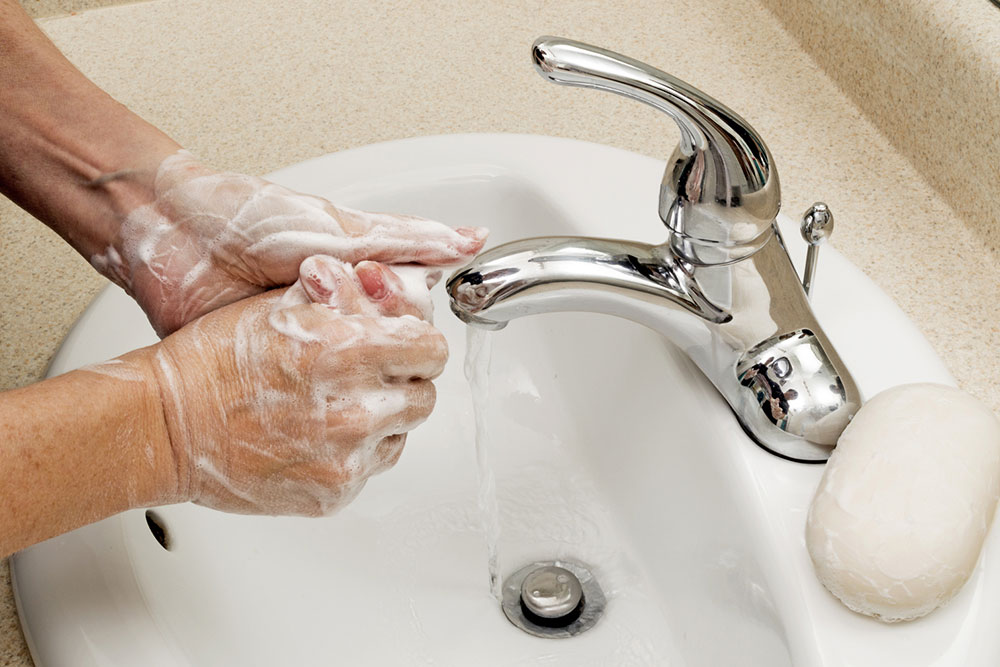6 types of soaps to avoid when dealing with eczema

Eczema is a chronic skin condition characterized by red, itchy, and inflamed skin patches. The condition can be exacerbated by various factors, including the use of certain products that are meant to clean the skin and get rid of oil and dirt. Here, certain soaps have been known to trigger eczema symptoms, especially in those with sensitive skin. Recognizing common irritants in these products and avoiding them is crucial for managing eczema.
Soaps with fragrances
Artificial fragrances, commonly found in soaps and skincare products, can be a significant trigger for those with eczema. These synthetic ingredients are designed to add a pleasant scent, but they often contain compounds that can cause skin irritation, redness, itching, and, in severe cases, allergic contact dermatitis. For those with eczema, choosing fragrance-free products significantly reduces the risk of adverse reactions.
Soaps with parabens
Parabens are synthetic preservatives widely used in personal care products and cosmetics to extend their shelf life. While effective at preventing bacterial growth, paraben can trigger irritation in sensitive skin. Those with eczema might experience redness upon using such soaps. Here, one should check the ingredient label and skip soaps with ethylparaben, methylparaben, or butylparaben, as opting for paraben-free products reduces the risk of allergic reactions when dealing with eczema.
Sulfate-based soaps
Sodium lauryl sulfate (SLS) and sodium lauryl ether sulfate (SLES) are foaming agents found in many soaps and shampoos. While they are added to help create a satisfying lather, they can strip the skin of its natural oils. This makes it dry and vulnerable to irritation, exacerbating eczema symptoms. Sulfate-free options are gentler on the skin, making them a safer choice for those with eczema. Numerous products are available today that cater to sensitive skin, including sulfate-free soaps, shampoos, and hand washes.
Soaps with harsh dyes
Synthetic dyes are added to many personal care products to enhance their visual appeal. Unfortunately, they often contain chemical compounds that can irritate sensitive skin. Constant use of soaps and cleaning products with harsh colorants or dyes can worsen eczema symptoms. Sometimes, the dyes can lead to rashes that may require treatment. Those dealing with eczema can experience increased redness and itching upon using such products. To mitigate these risks, those with eczema should choose products without any artificial colorants.
Soaps with harmful preservatives
Formaldehyde-releasing preservatives are added to certain soaps to prolong their shelf life. However, they can be harsh on the skin and lead to allergic reactions, sometimes in the form of contact dermatitis. This can manifest as redness, itching, and swelling. For those with eczema, preservative-free or naturally preserved soaps are better options.
Soaps with propylene glycol
Propylene glycol is a humectant found in cosmetics and soaps. The ingredient can trigger an allergic reaction in those with sensitive skin. It can lead to irritation and hives if one is allergic to the ingredient. So, one should keep an eye out for this ingredient if they are dealing with skin irritation on using a soap.
Eczema-friendly ingredients
In addition to avoiding the above-mentioned harmful ingredients, one should choose soothing, moisturizing products that can help them deal with eczema symptoms. Here are a few skin-friendly options to consider:
Oatmeal: This is a natural ingredient known for its soothing properties, making it an excellent choice for those with eczema. It contains anti-inflammatory compounds that can calm irritation and reduce redness associated with eczema. So, one should look for soaps that list colloidal oatmeal as an ingredient, as it retains the full benefits of oats.
Shea butter: Derived from the nuts of the shea tree, shea butter is a rich emollient that provides intense moisturization. Its high fatty acid content helps seal in moisture and strengthen the skin’s natural barrier. For those with eczema, shea butter-infused soaps can relieve dryness and help restore the skin’s hydration levels.
Coconut oil: Coconut oil is a versatile ingredient with powerful moisturizing properties. It contains fatty acids that penetrate the skin, locking in moisture and preventing water loss. Soaps enriched with coconut oil can provide nourishment and hydration, which is especially beneficial for those with eczema-prone skin.
Honey: A natural humectant, honey helps attract and retain moisture on the skin surface. It also possesses anti-inflammatory properties that can help soothe irritated skin. So, honey-infused soaps can offer hydration and help alleviate dryness and discomfort associated with eczema.
Calendula: Calendula, derived from marigold flowers, is known for its anti-inflammatory and antiseptic properties. It can help calm irritated skin and promote healing. Soaps containing calendula extract or oil can be particularly soothing for those with eczema, as they reduce inflammation and redness.
Chamomile: Chamomile is known for its gentle, calming effects on the skin. It contains compounds like chamazulene and alpha-bisabolol, which have anti-inflammatory properties. Chamomile-infused soaps can help soothe eczema-prone skin, reducing redness and irritation.
Aloe vera: Aloe vera is widely recognized for its soothing and healing properties. It contains polysaccharides that promote skin repair and hydration. Soaps with aloe vera can provide relief from itching and redness associated with eczema, making them a beneficial choice for those managing this condition.
Jojoba oil: Jojoba oil closely resembles the natural sebum produced by the skin, making it an excellent moisturizer. It gets absorbed easily, providing hydration without clogging pores. Soaps enriched with jojoba oil can help maintain skin moisture levels, which is essential for dealing with eczema.
Avocado oil: Avocado oil is rich in vitamins, fatty acids, and antioxidants that nourish and hydrate the skin. It helps strengthen the skin’s natural barrier, making it an effective ingredient for those with eczema. So, soaps containing avocado oil can contribute to maintaining healthy, moisturized skin.
Licorice extract: Licorice extract has anti-inflammatory and skin-soothing properties, helping reduce redness and irritation associated with eczema. Soaps incorporating licorice extract can be beneficial for those seeking relief from eczema symptoms.







